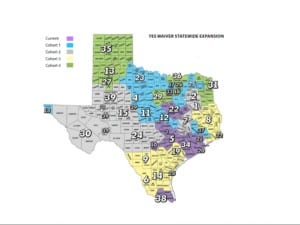A social work student discovers how research can help Texas children with mental health needs

One afternoon last May, master’s student Lindsey Hollmann-Butz found herself in a conference room with a number of executive directors from mental health agencies and representatives from the Texas government.
They all were looking at reports that Hollman-Butz had helped prepare in her role as research assistant with the Texas Institute for Excellence in Mental Health (TIEMH).
“It was probably one of the most interesting moments I had in graduate school. One, all these important people were looking at my work! Two, I started to see the reason for the research I was doing at TIEMH: We go in between these two big players, the Texas Department of Health and Human Services and mental health agencies, and try to help them work together,” she reflects.
An articulate and enthusiastic Californian, Hollmann-Butz came into social work with a psychology background and the goal of going into private practice as a counselor.
“To be honest, macro social work didn’t matter that much to me when I started the program. To me, direct practice with clients seemed much more important and meaningful than working on policies that, I thought, mostly ended up hindering people,” she remembers.
But what she learned in the classroom about macro aspects of social work such as policy making and advocacy intrigued her enough to make her apply for a research assistant position with Erin Espinosa at TIEMH.
In this position, she joined a team that is providing support for and evaluating the implementation of Wraparound the YES Waiver across Texas.
Wraparound is a “care coordination model” that targets children with the most intense mental health needs and who many times are involved in multiple system—for instance, they may be struggling in school or be in trouble with the law.
Wraparound has the goal of coordinating services, funding, and communication across different systems to maximize resources, avoid costly psychiatric hospitalizations, and provide better support for children and families in their homes and communities.

Families recommended for Wraparound are eligible for the YES Waiver, which gives them access to extra funds to pay for mental health services not generally covered by insurance plans, such as respite care and non-traditional therapies. Initially offered in just three Texas communities, the YES Waiver was rolled out state-wide in 2015.
“Because I had never done any research, at the beginning I was not sure of the purpose of what I was doing. But then, as I was working with the data I was like, wait a minute, why are some of these kids not put in the appropriate level of care? Why are these families not benefitting from the YES Waiver?” Holmann-Butz recalled.
Fast-forward to the May meeting, where TIEMH presented the results, and helped mental health agencies and representatives from the Texas Department of Health and Human Services understand where the implementation kinks were.
“Wraparound is great for families but is also complex. Implementing it is not going to be just like that!” Hollmann-Butz says as she snaps her fingers. “As with anything new, it can take a while until everybody adjusts.”
“There are so many little details that need to be ironed out, down to which billing codes mental health agencies must use to get adequate reimbursement. Our goal was to enlighten everyone about what was going on and to help them see that if they do it correctly, they will save money and kids and families will be better served,” she adds.
Hollmann-Butz graduated this past August, but she has stayed with TIEMH working on Wraparound evaluation and other implementation efforts around the YES Waiver. She smiles as she remembers that, barely two years ago, she was so sure that she wanted to be a therapist.
“I realized through this work that I don’t want to go into private practice but instead want to do a mix of things,” she reflects. “Case management seems ideal because I can use my clinical skills to help families and children on an individual level but I can also actively advocate for families, get things done at a macro level, and have an impact on a larger population. I find that very exciting.”
Posted September 15, 2016. By Andrea Campetella.


